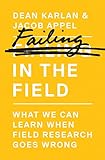Failing in the Field : What We Can Learn When Field Research Goes Wrong / Jacob Appel, Dean Karlan.
Material type: TextPublisher: Princeton, NJ : Princeton University Press, [2016]Copyright date: ©2017Description: 1 online resource (176 p.) : 2 line illusContent type:
TextPublisher: Princeton, NJ : Princeton University Press, [2016]Copyright date: ©2017Description: 1 online resource (176 p.) : 2 line illusContent type: - 9780691161891
- 9781400883615
- Research -- Evaluation
- Research -- Methodology
- BUSINESS & ECONOMICS / Development / General
- Poultry Loan
- RCT design
- administrative data
- application process
- bad timing
- bloated surveys
- business training
- child health
- competing priorities
- credit-to-savings intervention
- data collection tools
- data collection
- development field studies
- development tool
- educational supplements
- electronic data collection
- evaluations
- evidence
- experimental design
- failed projects
- failed research
- failure
- field projects
- field research
- field study
- financial education program
- financial literacy
- group-based savings
- guarantor requirement
- health insurance policy
- immature product
- insurance
- intake process
- interest rate
- intervention
- low participation rates
- low participation
- measurement tools
- microfinance institution
- microloans
- participation rates
- partner organization challenges
- partner organization
- partner organizations
- pilot
- policy
- poultry farming
- power
- randomization
- randomized controlled trials
- research setting
- research studies
- research
- researchers
- sample size calculations
- savings
- staff capacity
- staff flexibility
- survey design
- survey questions
- survey
- surveying
- technical design flaw
- technical design flaws
- technical design
- technology
- theory
- timing problem
- treatment
- youth clubs
- youth savings
- 001.42 23
- Q180.55.M4
- online - DeGruyter
- Issued also in print.
| Item type | Current library | Call number | URL | Status | Notes | Barcode | |
|---|---|---|---|---|---|---|---|
 eBook
eBook
|
Biblioteca "Angelicum" Pont. Univ. S.Tommaso d'Aquino Nuvola online | online - DeGruyter (Browse shelf(Opens below)) | Online access | Not for loan (Accesso limitato) | Accesso per gli utenti autorizzati / Access for authorized users | (dgr)9781400883615 |
Frontmatter -- Contents -- Introduction: Why Failures? -- Part I. Leading Causes of Research Failures -- 1 Inappropriate Research Setting -- 2 Technical Design Flaws -- 3 Partner Organization Challenges -- 4 Survey and Measurement Execution Problems -- 5 Low Participation Rates -- Part II. Case Studies -- 6 Credit and Financial Literacy Training: No Delivery Means No Impact -- 7 Interest Rate Sensitivity: Ignoring the Elephant in the Room -- 8 Youth Savings: Real Money Drumming up Fake People -- 9 Poultry Loans: Trying to Fly without a Pilot -- 10 Child Health and Business Training with Credit: No Such Thing as a Simple Study -- 11 Bundling Credit and Insurance: Turns Out More Is Less -- Conclusion -- Appendix. Checklist for Avoiding Failures -- Acknowledgments -- Notes -- Bibliography -- Index
restricted access online access with authorization star
http://purl.org/coar/access_right/c_16ec
All across the social sciences, from development economics to political science departments, researchers are going into the field to collect data and learn about the world. While much has been gained from the successes of randomized controlled trials, stories of failed projects often do not get told. In Failing in the Field, Dean Karlan and Jacob Appel delve into the common causes of failure in field research, so that researchers might avoid similar pitfalls in future work.Drawing on the experiences of top social scientists working in developing countries, this book delves into failed projects and helps guide practitioners as they embark on their research. From experimental design and implementation to analysis and partnership agreements, Karlan and Appel show that there are important lessons to be learned from failures at every stage. They describe five common categories of failures, review six case studies in detail, and conclude with some reflections on best (and worst) practices for designing and running field projects, with an emphasis on randomized controlled trials. There is much to be gained from investigating what has previously not worked, from misunderstandings by staff to errors in data collection.Cracking open the taboo subject of the stumbles that can take place in the implementation of research studies, Failing in the Field is a valuable "how-not-to" handbook for conducting fieldwork and running randomized controlled trials in development settings.
Issued also in print.
Mode of access: Internet via World Wide Web.
In English.
Description based on online resource; title from PDF title page (publisher's Web site, viewed 30. Aug 2021)


